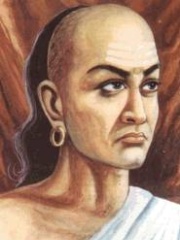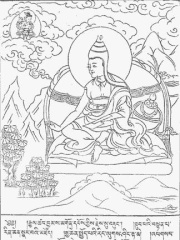



The Most Famous
PHILOSOPHERS from Pakistan
This page contains a list of the greatest Pakistani Philosophers. The pantheon dataset contains 1,267 Philosophers, 4 of which were born in Pakistan. This makes Pakistan the birth place of the 43rd most number of Philosophers behind Denmark, and Israel.
Top 4
The following people are considered by Pantheon to be the most legendary Pakistani Philosophers of all time. This list of famous Pakistani Philosophers is sorted by HPI (Historical Popularity Index), a metric that aggregates information on a biography's online popularity.

1. Chanakya (375 BC - 283 BC)
With an HPI of 77.08, Chanakya is the most famous Pakistani Philosopher. His biography has been translated into 121 different languages on wikipedia.
Chanakya (ISO: Cāṇakya, चाणक्य, ), according to legendary narratives preserved in various traditions dating from the 4th to 11th century CE, was a Brahmin who assisted the first Mauryan emperor Chandragupta in his rise to power and the establishment of the Maurya Empire. According to these narratives, Chanakya served as the chief adviser and prime minister to both emperors Chandragupta Maurya and his son Bindusara. Conventionally, Chanakya was identified with Kauṭilya and synonymously Vishnugupta, the author of the ancient Indian politico-economic treatise Arthashastra. Arthashastra is now thought with high probability to have been composed by multiple authors during the early centuries of the common era—several centuries after the Mauryan period—the backdated identification with Chanakya to have served to add prestige to the work.

2. Asanga (300 - 301)
With an HPI of 69.93, Asanga is the 2nd most famous Pakistani Philosopher. His biography has been translated into 33 different languages.
Asaṅga (Sanskrit: असंग, Tibetan: ཐོགས་མེད།, Wylie: thogs med, traditional Chinese: 無著; ; pinyin: Wúzhuó; Romaji: Mujaku) (fl. 4th century C.E.) was one of the most important spiritual figures of Mahayana Buddhism and the founder of the Yogachara school. Traditionally, he and his half-brother Vasubandhu are regarded as the major classical Indian Sanskrit exponents of Mahayana Abhidharma, Vijñanavada (awareness only; also called Vijñaptivāda, the doctrine of ideas or percepts, and Vijñaptimātratā-vāda, the doctrine of 'mere representation) thought and Mahayana teachings on the bodhisattva path. He is also traditionally considered as one of the seventeen Nalanda masters who taught at the monastery which is located in modern-day Bihar.

3. Fazlur Rahman Malik (1919 - 1988)
With an HPI of 57.45, Fazlur Rahman Malik is the 3rd most famous Pakistani Philosopher. His biography has been translated into 16 different languages.
Fazlur Rahman Malik ( FAHZ-luhr RAH-mahn MAL-ik; Urdu: فضل الرحمان ملک; September 21, 1919 – July 26, 1988), commonly known as Fazlur Rahman, was a modernist scholar and Islamic philosopher from present-day Pakistan. Recognized as a leading liberal reformer within Islam, he focused on educational reform and promoting independent reasoning (ijtihad). His work has attracted both significant interest and criticism in Muslim-majority countries. His reformist ideas led to protests by over a thousand clerics, faqihs, muftis, and teachers in Pakistan, ultimately resulting in his exile. After teaching in the UK and in Canada, where he formed a close friendship with philosopher Ismail al-Faruqi, Fazlur Rahman was appointed head of Pakistan’s Central Institute of Islamic Research in 1962. While widely respected among Islamic reformers, his ideas drew strong criticism from conservative scholars who viewed his approach as excessively liberal. Political opponents of his ally, General Ayub Khan, capitalized on this dissent, ultimately leading to Fazlur Rahman’s departure from Pakistan in 1968. He relocated to the United States, where he taught at the University of California, Los Angeles and later at the University of Chicago.

4. Aitzaz Hasan (1999 - 2014)
With an HPI of 29.84, Aitzaz Hasan is the 4th most famous Pakistani Philosopher. His biography has been translated into 15 different languages.
Aitzaz Hasan Bangash SS was a Pakistani student who died on 6 January 2014 while preventing a suicide bomber from entering his school at a Hangu village in Khyber Pakhtunkhwa province. More than 2,000 students were attending classes at the time of the incident. The institute was later renamed to Aitzaz Hasan Shaheed High School. His death anniversary is observed annually throughout Pakistan on 6 January. His life is covered by the biographical film Salute. Aitzaz's successful effort in saving his classmates captured the hearts of the nation, and he was hailed as a Shaheed and national hero. Later, the Government of Pakistan posthumously awarded him Sitara-e-Shujaat (Star of Valour). He was named as the Herald's Person of the Year for 2014.
People
Pantheon has 4 people classified as Pakistani philosophers born between 375 BC and 1999. Of these 4, none of them are still alive today. The most famous deceased Pakistani philosophers include Chanakya, Asanga, and Fazlur Rahman Malik. As of April 2024, 1 new Pakistani philosophers have been added to Pantheon including Aitzaz Hasan.
Deceased Pakistani Philosophers
Go to all RankingsChanakya
375 BC - 283 BC
HPI: 77.08
Asanga
300 - 301
HPI: 69.93
Fazlur Rahman Malik
1919 - 1988
HPI: 57.45
Aitzaz Hasan
1999 - 2014
HPI: 29.84

